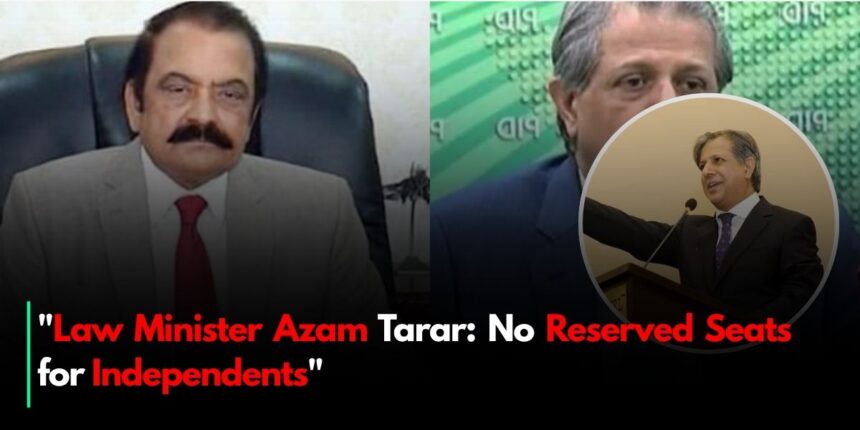Federal Law Minister Azam Nazeer Tarar has backed up the Supreme Court’s recent decision by making it clear that independent candidates cannot run for reserved seats in the assembly. He supported the Court’s reading of the Elections Act and said again that Parliament has the power to make changes after the Supreme Court’s landmark ruling.
Getting Through the Confusion
Azam Tarar said that reports in the media that independent candidates who win the February 2024 elections and are mostly linked with PTI should be able to get reserved seats for women and minorities after they join a party. He noted that this is a misunderstanding of both the wording of the law and the spirit of the changes that were made recently. An independent person stays that such until he formally joins a party within three days of the results, according to the existing Elections Act.
If a candidate runs with a symbol given to them by an official party, they are still a member of that party for all election-related purposes. The new law makes it illegal to give reserved seats to independents retroactively, even if they join a party afterward.
A Ref in a Stressful Game
Recent accusations that PTI-backed independent candidates could get seats after the fact caused political upheaval. But Tarar made it clear that supporting the independence of Parliament is not up for debate. He said that Parliament’s job is to make laws and that a change in the law immediately cancels out earlier orders, even those from the highest court.
The Law Minister made it clear that candidates who were connected with the PTI filed their nominations as independents, thus they can’t be backdated to a party affiliation when seats are given out.
Judicial vs. Legislative Power
Tarar agreed with the Supreme Court’s earlier decision on July 12, 2024, that the SIC/PTI-affiliated Independents could have reserved seats and that PTI was still a constitutional party even though it didn’t have its symbol.
After that decision, Parliament quickly changed Sections 66 and 104 of the Elections Act with the Second Amendment Act 2024. This closed the loophole that had let independents join a party after the election results.
Political Fallout and Review Requests
PTI officials have publicly spoken out against these changes and the decisions made by the Election Commission, promising to take the issue back to court.
Tarar said that the ECP’s review petitions and PTI-led challenges are part of the constitutional process and that reform must first go through Parliament, not the courts.
Wider Effects on Democracy in Pakistan
This fight shows a bigger problem: the conflict between judicial intervention and parliamentary supremacy. The Law Minister’s position shows that politicians won’t be afraid to establish laws in reaction to court decisions, especially ones that are controversial. This shows that they are still accountable to the people.
Critics are worried that this could lead to a situation where elected governments regularly ignore court decisions, which could hurt the integrity of the courts. But proponents say that Parliament should keep the power to make laws and that legislation should change to maintain the spirit of democracy.
The Bottom Line
Azam Tarar’s message is clear: independent candidates can’t claim reserved seats, and new changes to the law make that even clearer. His position shows that there is still a constitutional tug-of-war going on between the Court’s interpretation and Parliament’s right to run elections.
This issue is really about who makes the norms for representation in Pakistan: judges or elected officials?








